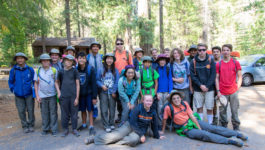Troop 27’s objective is to be “boy led”. This means the boys are active in planning what happens at troop meetings, outings and other activities. Naturally, they receive input and guidance from the Scoutmaster and Assistant Scoutmasters (ASMs). Scouts should be able to discipline themselves, create a fun-filled healthy environment, and become good citizens by being good leaders and followers. This policy sometimes means scouts make mistakes. It is OK if they don’t do it the “right way” or “your way” – they will often learn more by doing it their way. Adults should offer positive suggestions for improvement – often a whispered word to the Senior Patrol Leader (SPL) or a Patrol Leader is all that is needed for him to step up and handle an issue.
Scouts should strive to uphold the principles embodied in the Scout Oath and the Scout Law. Scouting should be a learning experience. Mistakes will be made and unacceptable behavior will manifest itself from time to time. Scouts should, as much as possible, be allowed to learn from their errors. Adults should step in whenever unsafe conditions exist and are not being noted or heeded by scouts, or when they observe unacceptable behavior.
Verbal and behavioral obscenity by scouts or adults is prohibited. Scouts are expected to conduct themselves as responsible young adults whose behavior reflects well on Scouting and all scouts. Adults are prohibited from smoking or alcohol consumption during all scouting activities.
Scouts are expected to be responsive to directions given by patrol leaders and the SPL, backed up by the Scoutmaster or an ASM. Scouts may not leave activities or outings early without the prior permission of the Scoutmaster or ASM in charge. In general, failure to join in planned activities and/or obstructive behavior will be addressed by the following successive measures: counseling by the Scoutmaster; temporary isolation from the rest of the Troop; removal from the troop meeting or outing by calling the boy’s parents to take him home. Dangerous activity will not be tolerated, and will be stopped by the Scoutmaster or an ASM employing all responsible means. It is the responsibility of the Scoutmaster to inform the boy and his parents of unacceptable behavior; discipline is the parent’s responsibility. Parents and the leaders must work together to solve behavior problems.
After earning Totin’ Chip a scout may carry a pocket knife. The knife blade may be no larger than the palm of the scout’s hand. Knives are not toys; they should not be “flicked” open and closed or played with, as it could be dangerous. Scouts who mishandle their knives may have them confiscated and returned to a parent.
Scouts are to do their share and take an active part in seeing to it that other scouts, as well as themselves, uphold the spirit of these expectations of behavior. Scouts should work together, through the scout leadership, and the adult leaders to deal with issues that arise.
There are times for playing hard and times for working hard. We expect scouts will learn the difference and learn to transition between fun and serious activities.
Scouts should quiet down and listen when the Scout Sign (three fingers) is up. This is the non-verbal way used to attract attention. The SPL, Scoutmaster or an ASM may call out “Sign’s Up!”, once if needed to attract the attention of scouts who have not noticed that others are quieting down. Parents and other visitors are also expected to refrain from talking when the Scout Sign is up or move outside or to an enclosed room for conversations.
The Hillsdale United Methodist Church sponsors the Troop and allows us to use Wesley Hall for our meetings. We should treat the facility as if we were guests in someone’s home. Church policy: DO NOT SIT ON TABLES. Scouts may not play on the toddler play equipment in the yard. Scouts cannot be outdoors unsupervised. Parents should be on time to pick up their scouts after meetings or upon the return from an outing.


